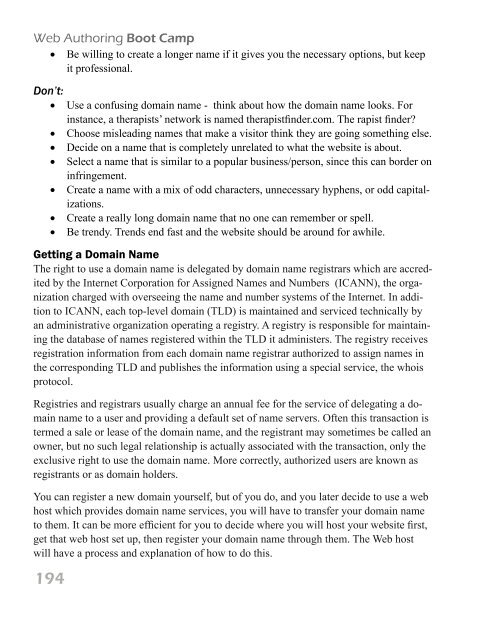Boot Camp
Web Authoring Boot Camp - StudioBast
Web Authoring Boot Camp - StudioBast
Create successful ePaper yourself
Turn your PDF publications into a flip-book with our unique Google optimized e-Paper software.
Web Authoring <strong>Boot</strong> <strong>Camp</strong><br />
• Be willing to create a longer name if it gives you the necessary options, but keep<br />
it professional.<br />
Don’t:<br />
• Use a confusing domain name - think about how the domain name looks. For<br />
instance, a therapists’ network is named therapistfinder.com. The rapist finder?<br />
• Choose misleading names that make a visitor think they are going something else.<br />
• Decide on a name that is completely unrelated to what the website is about.<br />
• Select a name that is similar to a popular business/person, since this can border on<br />
infringement.<br />
• Create a name with a mix of odd characters, unnecessary hyphens, or odd capitalizations.<br />
• Create a really long domain name that no one can remember or spell.<br />
• Be trendy. Trends end fast and the website should be around for awhile.<br />
Getting a Domain Name<br />
The right to use a domain name is delegated by domain name registrars which are accredited<br />
by the Internet Corporation for Assigned Names and Numbers (ICANN), the organization<br />
charged with overseeing the name and number systems of the Internet. In addition<br />
to ICANN, each top-level domain (TLD) is maintained and serviced technically by<br />
an administrative organization operating a registry. A registry is responsible for maintaining<br />
the database of names registered within the TLD it administers. The registry receives<br />
registration information from each domain name registrar authorized to assign names in<br />
the corresponding TLD and publishes the information using a special service, the whois<br />
protocol.<br />
Registries and registrars usually charge an annual fee for the service of delegating a domain<br />
name to a user and providing a default set of name servers. Often this transaction is<br />
termed a sale or lease of the domain name, and the registrant may sometimes be called an<br />
owner, but no such legal relationship is actually associated with the transaction, only the<br />
exclusive right to use the domain name. More correctly, authorized users are known as<br />
registrants or as domain holders.<br />
You can register a new domain yourself, but of you do, and you later decide to use a web<br />
host which provides domain name services, you will have to transfer your domain name<br />
to them. It can be more efficient for you to decide where you will host your website first,<br />
get that web host set up, then register your domain name through them. The Web host<br />
will have a process and explanation of how to do this.<br />
194


